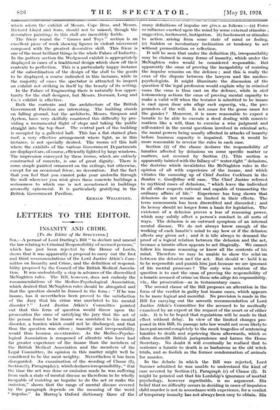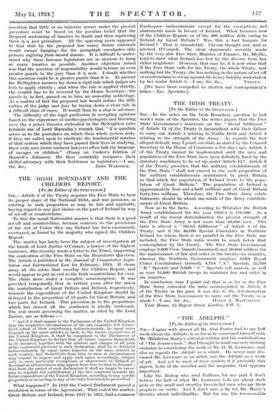LETTERS TO THE EDITOR.
INSANITY AND CRIME.
[To the Editor of the SPECTATOR.] SIR,-A perusal of Lord Darling's Bill "to declare and amend the law relating to Criminal Responsibility of accused persons," which has just been rejected by the House of Lords, shows that it was apparently a proposal to carry out the first and third recommendations of the Lord Justice Atkin's Com- mittee on Insanity and Crime, and the definition of responsi- bility proposed by the Council of the British Medical Associa- tion. It was undoubtedly a step in advance of the discredited McNaghten rules. The Bill, however, does not embody the recommendations of the Medico-Psychological Association, which desired that McNaghten rules should be abrogated and that the question should be framed in the form : "If he was insane, has it nevertheless been proved to the satisfaction of the Jury that his crime was unrelated to his mental disorder ? " Lord Justice Atkin's Committee pointed out that this form of question would throw upon the prosecution the onus of satisfying the jury that the act of the person found to be insane was unrelated to his mental disorder, a burden which could not be discharged, and that thus the question was otiose ; insanity and irresponsibility would thus become co-extensive. As the Medico-Psycho- logical Association is composed of alienists who have had far greater experience of the insane than the members of the British Medical Association and the members of the Legal Committee, its opinion in this matter might well be considered to be the most weighty. Nevertheless it has been disregarded. An examination of the Wording of Clause (I), Section (1), Paragraph (c), which declares irresponsibility," if at the time the act was done or omission made he was suffering from such a state of mental disease as therefrom to be wholly incapable of resisting an impulse to do the act or make the omission," shows that the range of mental disease covered by the paragraph depends on the meaning of the word "impulse," In Murray's Oxford dictionary three of the many definitions of impulse are given RS follows :—(a) Force or influence exerted up crn the mind by some external stimulus ; suggestion, incitement, instigation. (b) Incitement or stimulus to action, arising from some state of mind or _ feeling. (c) Sudden or involuntary inclination or tendency to act without premeditation or reflection.
It will be seen that under the definition (b), irresponsibility may be claimed in many forms of insanity, which under the
McNaghten rules would be considered responsible. But apparently the onus of proving the incapability of resisting the impulse remains on the defence ; and this is really the crux of the dispute between the lawyers and the medico-
psychologists. It might illuminate the discussion of the question if the legal profession would explain why in criminal cases the onus is thus cast on the defence, while in civil testamentary actions the onus of proving mental capacity to make a valid will when the testator is admitted to be insane is cast upon those who allege such capacity, viz., the pro-
pounders of the will. Is not sauce for the goose sauce for the gander ? Moreover, it is more reasonable to expect a lunatic to be able to execute a deed dealing with concrete matters like a will, than to exercise a wise judgment and self-control in the moral questions involved in criminal acts, the moral powers being usually affected in attacks of insanity before business capacity is impaired. Thus it would be more reasonable to reverse the rules in each case.
Section (2) of the clause declares the responsibility of lunatics affected by delusions on some specific matter or matters, not covered by Section (1). This section is apparently tainted with the fallacy of" water-tight" delusions, the doctrine which invalidates the McNaghten rules in the opinion of all with experience of the insane, and which vitiates the summing up of Chief Justice Cockburn in the Banker v. Goodfellow will case. The Chief Justice referred to mythical cases of delusions, "which leave the individual in all other respects rational and capable of transacting the ordinary affairs of life." Experience has long shown that delusions do not remain so limited in their effects. The term monomania has been discredited and discarded ; and its heresy should no longer form a basis for legislation. The existence of a delusion proves a loss of reasoning power, which may subtly affect a person's conduct in all sorts of ways. The delusion is an outward symptom of an internal mental disease. We do not always know enough of the working of each lunatic's mind to say how or if the delusion affects any given act ; and it is idle always to demand the proof of a logical relation between the delusion and the act, because a lunatic often appears to act illogically. We cannot follow his insane reasoning or know all the contents of his mind. Therefore we may be unable to show the relaf on between the delusion and the act. But should w hold hm to be responsible and punish him just because we are- ignorant of his mental processes ? The only wise solution of the question is to cast the onus of proving the responsibility of a lunatic accused of crinie`on those who allege his responsibility, viz., the prosecution—as in testamentary cases.
The second clause of the Bill proposes an alteration in the form of the verdict in guilty but insane cases, which appears to be more logical and merciful. No provision is made in the Bill for carrying out the sewenth recommendation of Lord Justice Atkin's Committee for the accused to be medically examined by an expert at the request of the court or of either side. It is to be hoped that regulations will be made to that effect without delay. In view of the limited changes pro- posed in this Bill, its passage into law would not seem likely to have put an end completely to the mock tragedies of sentencing lunatics to death and reprieving them afterwards, which so often discredit British jurisprudence and harass the Home Secretary. No doubt it will eventually be realised that to sentence a lunatic to death is as barbarous as the old witch trials, and as foolish as the former condemnation of animals for murder.
In the debate in which the Bill was rejected, Lord Sumner admitted he was unable to understand the kind of case covered by Section (1), Paragraph (c) of Clause (I). It might be pointed out that his Lordship's ignorance of morbid psychology, however regrettable, is no argument. His belief that no difficulty occurs in deciding in cases of impulsive child murder is not in accordance with experience, for a verdict of temporary insanity has not always been easy to obtain. His assertion that ,little or no injustice occurs under the present procedure must be- based On the peculinr belief that the 'frequent sentencing of lunatics to death and then reprieving them is a just procedure. All the opposing peers appeared to fear that by the proposed law many insane criminals would escape hanging—for the paragraph exculpates only persons suffering from mental disease. It is difficult to under- stand why these humane legislators are so anxious to hang as many lunatics as possible. Another objection raised was that the question of responsibility would become an even -greater puzzle to the jury than it is now. I doubt whether this question could be a greater puzzle than it is. At present the McNaghten answers lay down a rigid rule which judges are loth to apply strictly ; and when the rule is applied strictly, the verdict has to be reversed by the Home Secretary—the puzzle is, in fact, passed on to him, an unworthy subterfuge. As a matter of fact the proposed law would reduce the diffi- culties of the judge and jury by laying down a clear rule in a difficult class of cases. It would thus be a step in advance.
The difficulty of the legal profession in accepting opinions based on the experience of medico-psychologists and throwing over the a priori theories embodied in the MeNaghten rules reminds one of Lord Macaulay's remark that "if a question
arises as to the postulates on which their whole system rests, if they are called upon to vindicate the fundamental maxims of that system which they have passed their lives in studying, these very men (some eminent lawyers) often talk the language of savages or children" (Essay on Croker's Edition of Boswell's Johnson). He then scornfully compares their skilful advocacy with their feebleness as legislators.—I am,











































 Previous page
Previous page